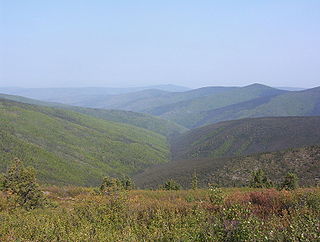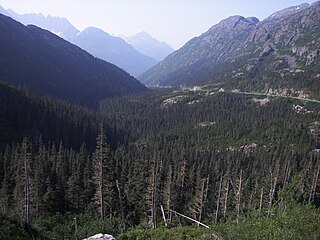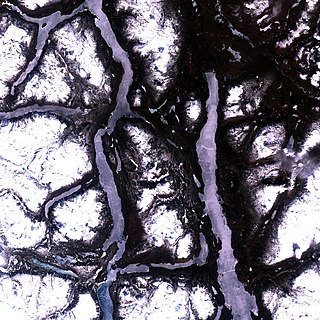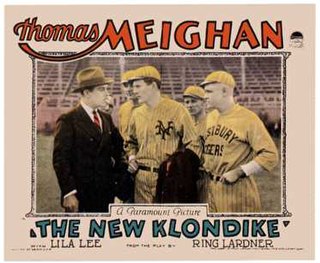
The Klondike is a region of the territory of Yukon, in northwestern Canada. It lies around the Klondike River, a small river that enters the Yukon River from the east at Dawson City.

Klondike, also known as Canfield, is a card game for one player and the best known and most popular version of the patience or solitaire family, something which "defies explanation" as it has one of the lowest rates of success of any such game. Partly because of that, it has spawned numerous variants including Batsford, Easthaven, King Albert, Thumb and Pouch, Somerset or Usk and Whitehead, as well as the American variants of the games, Agnes and Westcliff. The distinguishing feature of all variants is a triangular layout of the tableau, building in ascending sequence and packing in descending order.

The Klondike Gold Rush was a migration by an estimated 100,000 prospectors to the Klondike region of Yukon, in north-western Canada, between 1896 and 1899. Gold was discovered there by local miners on August 16, 1896; when news reached Seattle and San Francisco the following year, it triggered a stampede of prospectors. Some became wealthy, but the majority went in vain. It has been immortalized in films, literature, and photographs.

A Klondike derby is an annual event held by some Boy Scouts of America and Scouts Canada districts during the winter months and is based on the heritage of the Klondike Gold Rush. BSA units have been running Klondike derbies since 1949.

Dawson City, officially the City of Dawson, is a town in the Canadian territory of Yukon. It is inseparably linked to the Klondike Gold Rush (1896–1899). Its population was 1,577 as of the 2021 census, making it the second-largest town in Yukon.

White Pass, also known as the Dead Horse Trail, is a mountain pass through the Boundary Ranges of the Coast Mountains on the border of the U.S. state of Alaska and the province of British Columbia, Canada. It leads from Skagway, Alaska, to the chain of lakes at the headwaters of the Yukon River, Crater Lake, Lake Lindeman, and Bennett Lake.

Tagish Lake is a lake in Yukon and northern British Columbia, Canada. The lake is more than 100 km (62 mi) long and about 2 km (1 mi) wide.

Klondike Gold Rush National Historical Park is a national historical park operated by the National Park Service that seeks to commemorate the Klondike Gold Rush of the late 1890s. Though the gold fields that were the ultimate goal of the stampeders lay in the Yukon Territory, the park comprises staging areas for the trek there and the routes leading in its direction. There are four units, including three in Municipality of Skagway Borough, Alaska and a fourth in the Pioneer Square National Historic District in Seattle, Washington.

K-Days, formerly known as the Edmonton Exhibition, Klondike Days, and the Capital Ex, is an annual 10-day exhibition held in Edmonton, Alberta, Canada mostly in late July. In recent years it has attracted between 700,000 and 800,000 visitors per year. It runs in conjunction with the Taste of Edmonton and – from 2006 through 2012 – the Edmonton Indy.
Chipped chopped ham or chipped ham is a processed ham luncheon meat made from chopped ham. Chopped ham is a mixture of ham chunks and trimmings and seasonings, ground together and then packaged into loaves. By chipping or shaving the meat loaf against a commercial meat slicer blade, the resultant thinly sliced product has a different texture and flavor compared to thickly sliced ham. In western Pennsylvania, northern West Virginia and eastern Ohio, the slicing process is also referred to as "Pittsburgh style".
Klondike is a neighborhood in eastern Louisville, Kentucky, United States. Due to being on the edge of the old city limits, its boundaries are irregular, it is south of Hikes Lane and west of Breckenridge Lane. Development began after World War II, with developers Edward Butler and Chester Cooper purchasing and subdividing 45 acres (180,000 m2) of the Graff farm and part of the Hikes family's Midlane farm.

USS Klondike (AD-22/AR-22) was a destroyer tender in service the United States Navy from 1945 to 1970. In 1960, she was redesignated as a repair ship. After spending another five years in reserve, she was sold for scrap in 1975.

Choco Taco was a Good Humor-Breyers ice cream novelty resembling a taco. It consisted of a disk of waffle cone material folded to resemble a hard taco shell, reduced-fat vanilla ice cream, artificially flavored fudge, peanuts, and a milk chocolate coating. The "Choco Taco" was marketed under the Klondike brand as "The Original Ice Cream Taco".

Klondike Annie is a 1936 American Western film starring Mae West and Victor McLaglen. The film was co-written by West from her play Frisco Kate, which she wrote in 1921 and a story written by the duo Marion Morgan and George Brendan Dowell. Raoul Walsh directed.
The Kakamega gold rush occurred at Kakamega, Kenya in the early 1930s, fueled partly by the reports of the geologist Albert Ernest Kitson. In his report for the Colonial Office Kitson suggested that possibly as much as half of the gold being prospected was wasted by amateur techniques. In an article for the magazine The Spectator, Kitson compared the influx of amateur gold-prospectors to the Klondike Gold Rush in Canada in 1897-8 : "The road to Kakamega now resembles a miniature 'trail of 98' without the snow. Old mining men, from ex-Klondyke Pioneers to Australian backwoodsmen, are hurrying to the spot". But it seems that Kitson's initial report had helped create the rush in the first place by highlighting the rich pickings available. As The Spectator noted "Since the publication of Sir Albert Kitson's report, the population of the Kakamega goldfields had doubled". Kitson's article in this magazine merely fueled the rush still further.

Klondike is an unincorporated community in Oconto County, Wisconsin, United States. The community is located at the intersection of Oconto County Highways ZZ, B, and Z, in the town of Brazeau, Wisconsin. It is located at latitude 45.068 and longitude -88.16 at an elevation of 791 feet.

The New Klondike is a 1926 black-and-white silent romantic comedy sports drama film directed by Lewis Milestone for Famous Players–Lasky. The film was set against the backdrop of the Florida land boom of the 1920s, and stands as Ben Hecht's first film assignment.

Klondike is a three-part miniseries about the Klondike Gold Rush that was broadcast by the Discovery Channel on January 20–22, 2014. Based on Charlotte Gray's novel Gold Diggers: Striking It Rich in the Klondike, it is the Discovery Channel's first scripted miniseries. Klondike was directed by Simon Cellan Jones and stars Richard Madden as Bill Haskell, a real-life adventurer who traveled to Yukon, Canada, in the late 1890s during the gold rush.

Klondike Peak is located in the northern Wind River Range in the U.S. state of Wyoming. Situated 4 mi (6.4 km) north of Gannett Peak, Klondike Peak is within the Bridger Wilderness of Bridger-Teton National Forest and west of the Continental Divide. The summit of Klondike Peak is partially capped by a small glacier and the northwest flank of the peak is the origination point of J Glacier, while Sourdough Glacier lies just to the northeast. Klondike Peak is the 26th tallest peak in Wyoming.


















